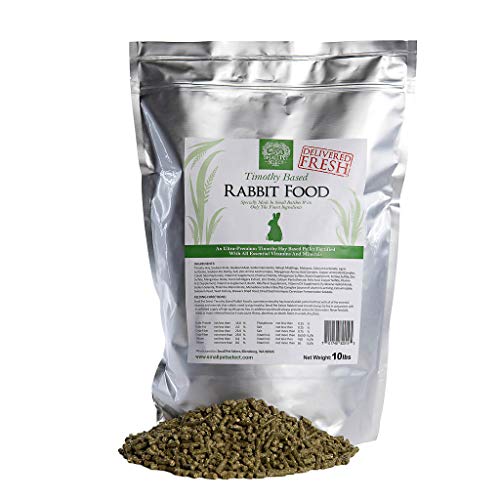The Bun Diet
Hay, Pellets, veggies, Treats
A healthy diet is extremely important for rabbits as they are made to be constantly consuming and 'passing' food. Without a proper diet, a rabbit will encounter all kinds of health issues such as GI Stasis. A rabbit's diet should have hay and pellets every single day. Fresh veggies are a good supplement to their diet every day as well.
Note: Rabbits should never go 24 hours without eating; if you notice your rabbit is not interested in eating or drinking within 24 hours, get him to a vet immediately.
Here are some tips for a balanced diet for your bunny to maintain that impressive loaf-like physique:
Timothy Hay (for rabbits 1+ years old):
Hay is the #1 staple for a rabbit's diet. You want to make sure you rabbit has access to hay 24/7. One of the best quality hays out there is Small Pet Select hay. This hay smells amazingly fresh. The 10 pound box lasts 1-1.5 months for 2 rabbits, about two months for 1. Check out Small Pet Select to save 15% on your first purchase!
Alfalfa Hay (for bunnies under 1 year old):
Alfalfa hay should be mixed with Timothy hay for bunnies from the time they are weaned until about 5-6 months old. Alfalfa is rich in calcium and protein, helping bunnies to stay healthy and strong as they grow. Alfalfa hay is not necessary for rabbits over 1 year old.
Pellets
Pellets are a close second staple in a rabbit's diet and part of their every day feeding. Rabbits should get 1/8 cup of pellets per 10 pounds of body weight. Plain, brown pellets with at least 18% of fiber and 12% protein (16% for baby buns) are the best and healthiest option for your rabbit. Make sure the pellets you buy are high quality (they are not all created the same); rabbit pellets should have Timothy hay as the first ingredient and be high in protein and fiber. Pellets should never have 'junk food' in it; this means seeds and anything colorful.
Veggies
There are many veggies that are good for rabbits, but don't make the mistake of assuming all of them are safe for your rabbit. A handful of 2-3 different kinds of veggies a day is a good daily supplement. Rabbits 4 months old or younger should not be given veggies until they are old enough.
Unsafe veggies for rabbits:
Iceberg lettuce, cabbage, broccoli, onion, tomato, cauliflower
Some of these veggies cause gas in rabbits, and since rabbits cannot pass gas, it can be very painful and even fatal for them.
Safe veggies for rabbits:
Kale (very sparingly), romaine lettuce, parsley, cilantro, celery (broken into 1/2" pieces), carrot tops (green part), collard greens, mustard greens, clover, dandelion leaves, dill, mint, water cress
Treats
Treats should be given sparingly and should always be very low in sugar.
No more than 5-6 Cheerios/day
No more than 1 unsweetened banana chip/day
Very occasional small piece of fruit (i.e. a strawberry, raspberry or piece of banana)
Very occasional baby carrot (they are high in sugar and calcium and should be a treat rather than part of your rabbit's regular diet; baby carrots make a great occasional treat)
Note: Salt licks are not necessary or healthy for your rabbit to have as a treat.
Water
Make sure that fresh water is always available to your rabbit. A glass or plastic BPA-free water fountain or gravity water bowl is best. Studies show that when given the choice, rabbits will choose drinking out of a bowl versus a hanging water bottle. It’s also more natural for them to drink out of a bowl. I have this one and my buns love it!
If you choose to use a regular bowl rather than an automatic waterer, make sure you change the water daily and that the bowl is heavy enough so that your bun doesn’t knock it over.
As an Amazon Associate I earn from qualifying purchases.







